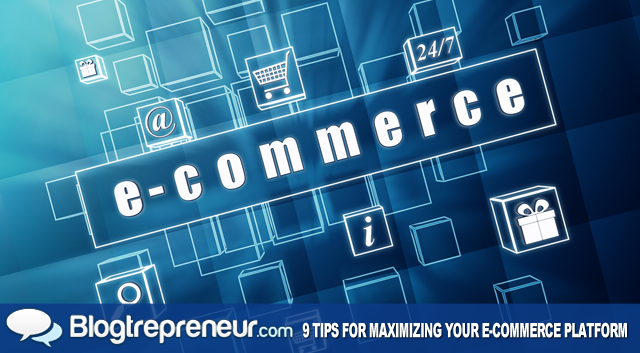9 Tips for Maximizing Your E-Commerce Platform

Within the last decade, e-commerce has crept its way into our daily lives as the Internet market has boomed. Online stores pop up every day, making it difficult for retailers to distinguish themselves among the masses. How can you make your mark in the e-commerce realm and avoid the common missteps of many entrepreneurs? Here are some tips for maximizing your online retail platform:
1. Do Your Homework
Before starting an e-commerce business, do as much research as possible. The world of e-commerce is both exciting and complex. E-commerce entrepreneurs need to be Internet gurus, developing expertise in everything from SEO to analytics analysis. It’s important (and more wallet-friendly) to understand these concepts yourself so you don’t have to rely on third-party companies.
2. Create a Strategy
With relatively low barriers to entry compared to brick-and-mortar stores, e-commerce stores seem pretty simple. Some entrepreneurs believe they can create an online store and watch the orders roll in. This is certainly not the case. Successful e-commerce requires strategy – many online retailers are going head-to-head with multi-billion dollar companies. You have to think big and plan bigger to compete with the big guys.
3. Find a Mentor
E-commerce entrepreneurs, like any new professional, will benefit from working with a mentor. Seek out successful e-commerce business owners and meet with them, regardless of their industry. Whether you sell furniture or cleaning supplies, the businesses do the same thing — sell products.
4. Understand That Size Doesn’t Matter
E-commerce is an exciting world as small businesses are able to compete with more well-established businesses. As a smaller e-commerce business, you’re able to be nimble and quick — what you lack in budget you can make up in speed. Smaller companies can make split-second changes while many large companies are not able to move quickly because of bureaucracy and layers of approval.
5. Know That Speed Does Matters
Any smart online entrepreneur will tell you speed is fundamental to e-commerce success, and things don’t necessarily need to be perfect before you launch them. If everything is perfect, it probably took too long and an opportunity was lost, meaning you’re behind. Don’t get caught in the cycle of waiting. The key to success is continuous split testing and tweaking to increase conversions. Test, and test often.
6. Don’t Forget About Security
You don’t want to be “that store.” You know, that online store where you got an awesome deal, but it led to a $1,000 charge in Dallas, Texas for 500 tiki torches. Many e-commerce entrepreneurs view security as an afterthought. Customers have become more confident during the past few years, entrusting online businesses with their credit card and address information. However, a new wave of cyber threats is shaking that trust. If your website is breached by cyber criminals and personal information is stolen, there is a hefty fine of $50,000. You owe it to your company — and your customers — to make security a priority.
7. Educate Yourself Constantly
E-commerce is constantly changing. It’s not the same as it was five years ago, and it won’t be the same within the next five. You can’t simply “get up to speed” and continue to find success. You have to continually educate yourself and engage in the e-commerce conversation or you’ll fall behind.
8. Learn by Example
Have you heard of Zappos, MailChimp, or Amazon? Of course you have. These companies are titans in the e-commerce industry. Each excels in a unique area. Zappos is the king of split testing to increase conversions, and it (rightfully) prides itself in the customer support it provides. MailChimp does an incredible job of focusing on what its customers want and giving it to them. And Amazon, the greatest of them all, is the master of product recommendations. It also does a great job of boosting average order size by recommending products that complement a person’s order. E-commerce entrepreneurs can definitely learn from these companies’ examples
9. Find a Marketing Tactic
It’s hard to compete with large companies’ insane shipping carrier discounts and multi-million dollar advertising budgets, but marketing is still important to smaller e-commerce businesses. Pay-per-click and ad-targeting campaigns can be extremely effective. The campaigns are only as good as the team running them, so it’s important to either educate yourself about these products or hire a company that can manage these for you. If you work with a company, make sure it is results-driven.
The e-commerce arena is fast-paced, exciting, and ever changing. E-commerce has transformed the retail landscape, creating new opportunities for small businesses. By using these tips and tricks, you can stay ahead of the game and work your way to e-commerce success.
Tyler Shearburn is the CEO and Founder of Comfy Sacks, an online retailer of over-sized beanbags. In order to really know his products, Tyler owns every size Comfy Sack his company sells. On the side, Tyler consults with e-commerce platforms on their structure and strategy. He encourages readers to reach out to him on LinkedIn or Twitter.
